
UK government will pay £200 million to replace Grenfell-style cladding
The UK government has promised to pay to replace combustible cladding on private high-rise housing, almost two years after the Grenfell Tower fire.
A reported 176 privately-owned residential buildings were found to have Grenfell-style aluminium composite cladding on their facades, leaving an estimated 20,000 people unsure of how their homes would be made safe.
"Today I can confirm we will now be fully funding the replacement of cladding on high-rise private residential buildings," said prime minister Theresa May.
"We've seen a number of private building owners doing the right thing and taking responsibility, but unfortunately too many are continuing to pass on the costs of removal and replacement to leaseholders."
Residents were previously left with bill
Seventy-two people died in 2017 when a fire broke out in a flat in Grenfell Tower, spreading rapidly up and round the building via the combustable and poorly-fitted cladding.
Last year May pledged £400 million to cover the bill for social-housing blocks, but privately-owned towers were left find the funds themselves.
Despite the government asking property owners not to pass the cost of making the buildings safe on to leaseholders, many residents found themselves being handed bills for thousands of pounds.
Government forced to act against "reckless" building owners
Residents of one development in Croydon that was found to have combustable cladding were handed a bill of £2 million when the private owners refused to pay. Barratt Homes, who originally built then sold the building, eventually stepped in to cover the cost to make the building safe.
"While some building owners have been swift to act, and I thank them for doing the right thing, I am now calling time on the delay tactics of others," said housing secretary James Brokenshire. "If these reckless building owners won't act, the government will."
The type of aluminium composite cladding used for the renovation of Grenfell Tower was legal at the time, but has since been banned by the government from being used on any new high-rise buildings.
Leaked emails from the time of Grenfell Tower's refurbishment suggest the aluminium panels were chosen over a more fire-proof zinc-cladding option to save £293,000 due to pressure from the local council to keep costs down.
Main image by Loz Pycock via Wikimedia commons.